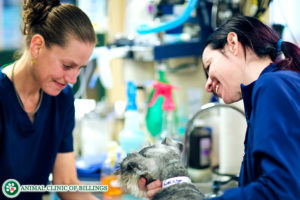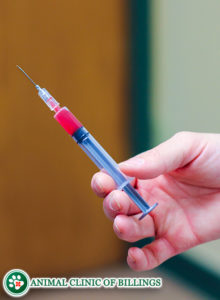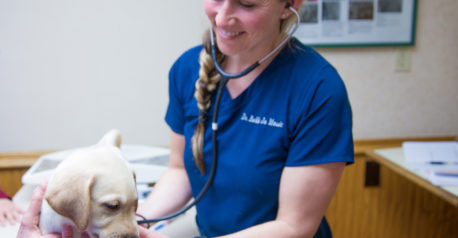Vaccinations
Pet vaccinations are one of the most critically important aspects of any preventive care plan for dogs and cats. Sometimes, a client will insist that their dog or cat doesn’t need a vaccine that is recommended by one of our veterinarians because the disease the vaccine protects against is too rare or their dog or cat has a low risk of exposure. It’s important to understand that the only reason these diseases are so rare is because of the large-scale vaccination of the canine and feline populations. If enough dog and cat owners stop getting their dogs and cats vaccinated, this will cause a sudden resurgence of these deadly but easily preventable diseases.
Once your veterinarian has a recommended vaccination schedule for your pet, be sure to follow it. Proper vaccinations protect your dog or cat from diseases that seriously threaten his or her health, well-being, and quality of life.
A typical vaccination schedule for dogs and cats consists of several immunizations given three times in 4 to 6-week intervals to your dog or cat as a puppy or kitten, followed by vaccine boosters one year after that, and then less frequently, but still periodically throughout the rest of your dog or cat’s life as recommended by your veterinarian.
Everything You Need to Know About Vaccinating Your Dog

Perhaps one of the most critical ways to protect your dog from many dangerous and potentially fatal diseases is to ensure they’re properly vaccinated. Montana state law requires all dogs be vaccinated for rabies. Additionally, there are a number of other safe and effective vaccinations that our veterinarians strongly recommend to protect your dog from serious diseases.
At the Animal Clinic of Billings and Animal Surgery Clinic, we have spent decades educating our clients on the importance of dog vaccinations. Vaccines are one of the most critically important aspects of any preventive care plan for dogs. Sometimes, a client will insist their dog doesn’t need a vaccine being recommended by one of our veterinarians because the disease the vaccine serves to protect against is too rare or their dog has a low risk of exposure.
 It’s important to understand that the only reason these diseases are so rare is because of large-scale vaccination of the canine population. If enough dog owners stop getting their dogs vaccinated, this will cause a swift resurgence of these deadly but easily preventable diseases.
It’s important to understand that the only reason these diseases are so rare is because of large-scale vaccination of the canine population. If enough dog owners stop getting their dogs vaccinated, this will cause a swift resurgence of these deadly but easily preventable diseases.
One of our veterinarians will recommend a proper vaccination schedule for your dog during your appointment. Following your veterinarian’s vaccination recommendations will ensure your dog stays protected from diseases that seriously threaten your dog’s health, well-being, and longevity.
What do dog vaccines do?
Vaccines mimic the presence of an infectious organism to help a dog’s immune system prepare to defend the body should it ever be exposed to the disease. Vaccines contain antigens, which are molecules present on the surface of a bacteria or virus that a dog’s immune system learns to recognize and react to by creating antibodies, which tag the organism for destruction. If exposed to the real organism, the immune system is primed to recognize and destroy the infection before it can establish itself in the body.
Puppy Vaccination Schedule
In general, a puppy should start vaccines at 8 weeks old and have boosters administered at 12 weeks old and again at 16 weeks old.
A typical vaccination schedule for a dog consists of several immunizations given three times in 4 week intervals to your dog as a puppy, followed by vaccine boosters one year after that, and then periodically throughout the rest of your dog’s life as recommended by your veterinarian.
One exception to the standard vaccine schedule is the rattlesnake vaccine, which is always recommended to be given in the late spring, just before snakes become active in our area.
Our veterinarians recommend the following vaccination schedule for puppies:
8 Weeks
- DHLPP (distemper, hepatitis, leptospirosis, parvovirus, parainfluenza)
- Bordatella (“kennel cough”)
12 Weeks
- DHLPP (distemper, hepatitis, leptospirosis, parvovirus, parainfluenza)
- Canine Influenza
- Lyme Disease
- Rattlesnake Vaccine
16 Weeks
- DHLPP (distemper, hepatitis, leptospirosis, parvovirus, parainfluenza)
- Canine Influenza
- Lyme Disease
- Rattlesnake Vaccine
- Rabies
Our veterinarians cannot stress enough the importance of proper immunization and keep up with your puppy’s vaccine schedule. Puppy vaccinations are proven to virtually eliminate a dog’s risk of contracting many serious diseases and illnesses. Your puppy deserves a chance at a long, healthy and happy life. Don’t run the risk of your new puppy contracting any of these terrible diseases when they’re so easily preventable with an affordable vaccine schedule.
Adult Dog Vaccination Schedule
DHLPP: This is a Core vaccine, recommended for all dogs. This is given as an initial series of 3 doses, 1 month apart, starting at 8 weeks old (until 6-8 weeks old, maternal antibodies in a puppy’s bloodstream prevent a vaccine from working); dogs older than 6 months with no/unknown vaccine status only need two doses one month apart. The “D-H-P-P” components need to be given every 3 years, but the “L” (Leptospirosis) component only lasts 1 year, so a separate Lepto-only vaccine can be given annually between the every-third-year DHLPP’s, or the full DHLPP can be given annually.
Protects against:
Distemper
A viral disease that attacks the respiratory, GI, and nervous systems. Spread by saliva and respiratory fluids from infected dogs or wildlife (esp. raccoons). Because it circulates in wildlife, outbreaks surface all across the country regularly. Usually fatal to unvaccinated animals.
Hepatitis
A viral disease that attacks the liver, kidneys, and eyes. Spread by body fluids from infected dogs. Often fatal.
Leptospirosis
A bacterial disease that attacks the liver and kidneys. It can be cured if diagnosed and treated early enough, otherwise, it is usually fatal. Transmitted by contact with water and soil contaminated by body fluids (especially urine) from infected animals (rodents, raccoons, skunks, deer, other dogs). It used to be thought of as a disease of hunting dogs, but we have seen it here in Billings in small breed “house dogs” who contracted it in their backyard. This disease is transmissible to people and can be life-threatening!
Parainfluenza
A viral disease of the respiratory tract, can cause fever, cough, and nasal discharge; spread by respiratory fluids. It can lead to pneumonia in some cases.
Parvo
A viral disease that attacks the GI tract and the immune system. Extremely contagious; transmitted by feces and contaminated objects and environments—can survive on surfaces and in the environment for months. Often rapidly fatal in puppies, and can also be fatal to adults.
Rabies
This is a Core vaccine, and is required by law.
The first dose a dog receives is only good for 1 year, regardless of age (they must be at least 12 weeks old). After the 1-year booster, it only needs to be given every 3 years.
Rabies is a viral disease that attacks the nervous system. Spread by contact with saliva or other body fluids, often through a bite. Carried by bats, raccoons, skunks, foxes, and other wildlife. 100% fatal to animals and humans once symptoms develop. Zoonotic—can be transmitted from a dog or other animal to a person.
Bordatella
This is a non-core vaccine. It is recommended for all dogs that come in contact with other dogs or with environments frequented by dogs, such as dog parks, daycare, boarding, groomer, etc. This is an oral vaccine that is given annually. This bacteria attacks the upper respiratory tract and is spread by respiratory fluids. It is very contagious and can lead to pneumonia in some cases.
Canine Influenza
This is a non-core vaccine. It is recommended for all dogs that regularly come in to contact with other dogs or with areas frequented by other dogs (dog parks, daycare, boarding, groomer, etc.) It is given as an initial series of 2 shots 1 month apart, then annually. This extremely contagious virus attacks the respiratory system, causing fever, cough, nasal discharge, lethargy, and inappetence. In some cases, it progresses to pneumonia, which can be life-threatening, especially for puppies, geriatric dogs, and any immune-suppressed individuals. Two strains exist in the US, and the vaccine we use here protects against both.
Rattlesnake Vaccine
This is a Non-core vaccine, recommended for dogs who spend time in areas where rattlesnakes may be encountered. There is an initial series of 2 doses 1 month apart, then it is given annually. It is important to administer it at the beginning of rattlesnake season, as protection wanes over the course of 12 months. In Montana, this is usually given in April or May.
If a dog is bitten and envenomated by a Western Diamondback Rattlesnake, the venom causes severe swelling, impaired blood clotting, low blood pressure, and multi-organ dysfunction. This is treated with antivenom (antibodies against the toxin) and plasma transfusions.
The vaccine stimulates the body to produce antibodies against this venom, and if a vaccinated dog is bitten, these antibodies will neutralize some of the venom, decreasing the severity of its effects. Urgent veterinary attention is still necessary, but usually, the patient is in better shape and will not require such intensive treatment as an unvaccinated dog.

Let our highly trained and experienced team of veterinarians and veterinary technicians help you keep your pet as happy and healthy as they can be.
Call and schedule an appointment for your four-legged friend today!
406-252-9499 Request an Appointment



